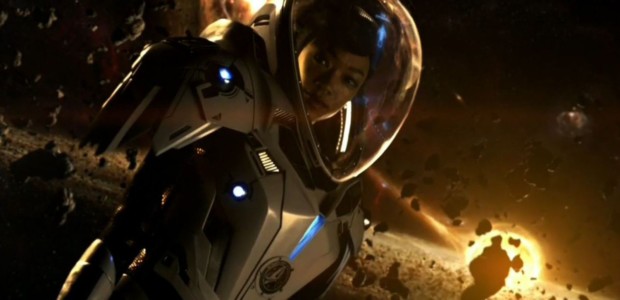Back in the nineties, I used to watch Star Trek: Voyager somewhat religiously. This had been at least a few years before I had really started to pay attention to film and television beyond just a surface level. A year or so later I would be reading whatever I could about film, listening to director commentaries and even writing a few screenplays of my own. As of this point in time however, I had mistaken the near-mindless entertainment of the show as something brilliant. People would talk about how terrible it was, as I would respond with something to the effect of “What are you talking about?” I would even use phrases such as “tripped out” to express my mistaken belief of good television. Between now and then television has grown in leaps and bounds of quality. With shows such as The Sopranos, Six Feet Under, or even Lost, what used to be mere entertainment can now be so much more. Has Star Trek learned anything between it’s last show (Enterprise) and it’s latest? A little maybe, but not really enough.
This past Sunday night we were transported back into the timeline of the original shows and movies, about ten years before Kirk, Spock and McCoy started their five year mission into deep space. It has been at least a hundred years since humans have had any contact with the Klingon Empire as the USS Shenzhou is sent out to the frontier to investigate a damaged communications relay. Leading the crew are Captain Philippa Georgiou, portrayed by the award-winning Michelle Yeoh and her extremely loyal First Officer Michael Burnham, played by The Walking Dead’s Sonequa Martin-Green. Needless to say, the Klingons turn out to be the ones behind the damaged relay.
My main problem with the show is the way the actors seem to be directed. Both Yeoh and Martin-Green have proven themselves in the past to be fine actors, yet nothing here comes across as being even remotely naturalistic. Nearly every line of dialogue is delivered in this quasi-TV commercial kind of way. Whenever a character says something clever, for some reason, they have to speak it with a smirk of their face that seems to say, “Look at me! I just said something clever!” VOYAGER suffered similar problems but that was over twenty years ago. Hasn’t Star Trek learned anything since then? Even the J.J. Abrams STAR TREK films are able to escape this method of delivery. Remember those old Power Records Star Trek dramas from the seventies and early eighties? What we have here comes across more like those, but those records were made for children, and that kind of voice acting does not translate well for a show that is clearly more aimed at the adult crowd. Oddly, the actors portraying the Klingons, hidden behind all their makeup and facial prosthetics, come across more believable than their human counterparts.
Speaking of Klingons, nerds everywhere must be rejoicing their inclusion in this new series. They’re surprisingly given about just as much screentime as Starfleet. Maybe even a little more. Their way of life and culture traditionally remains in the background or in supplemental Star Trek material. Here they are prominently featured as being much more than warmongering bumpy-headed aliens. Their way of life and their own power struggles shine in contrast to the human and Vulcan characters.
The Vulcans really get shortchanged here. For some illogical reason the writers decided to include Sarek (Spock’s father) in the new series. Previously the character has been quite brilliantly portrayed by both Mark Lenard and Ben Cross. Here, James Frain plays him as not much more than a wise old man. Although Spock never mentions an adopted sister, flashbacks reveal that the very human Michael Burnham had been raised by Sarek as a Vulcan after her family is slaughtered by Klingons. We are then given the usual, “You must suppress your human emotions” routine that we have previously seen time after time with the half-human Spock. This is all quite puzzling being that Michael is COMPLETELY HUMAN, yet is somehow expected to behave like a Vulcan. Where’s Spock when all these flashbacks occur? Vacationing on Earth with his human mother?
It’s not that the show is terrible, it’s just incredibly mediocre. The CGI is as good as you would expect for modern science fiction. The sets are amazing. The lighting of the USS Shenzhou’s bridge is nice and dark, in contrast to the brightly-lit bridges from previous Star Trek. The newly designed Klingons look great. The ending of the second episode brings about an interesting twist that changes the direction of the series early on, leading to something of a soft reboot for episode three. Despite everything, I might give it a few more episodes. There’s certainly quite a bit of room for improvement. One can hope.
Tags: Akiva Goldsman, Alex Kurtzman, Aliens, Anthony Rapp, Bryan Fuller, David Semel, Doug Jones, Eugene Roddenberry, Guillermo Navarro, James Frain, Jason Isaacs, Klingons, Mary Wiseman, Michelle Yeoh, Nicholas Meyer, Rainn Wilson, Recaps, Shazad Latif, Sonequa Martin-Green, Space, star trek, Terry Serpico, The 1990s, The Future, TV, Vulcans



No Comments